On April 2, a group of Colgate students and professors took part in the second interdisciplinary Spring Semester Symposium about “Narratives of Displacement” which has been organized by the German Area Studies Program of Hobart & William Smith Colleges in the spirit of academic collaboration among the colleges of the NYS Liberal Arts Consortium and Cornell University.
Following up on our previous Brown Bag “Heimat after Belonging – Engaging with Narratives of Displacement” with guest speaker Emina Mušanović, the Symposium initiated an even deeper immersion into contemporary topics like home and belonging with a special focus on forced migration. In a workshop, students read works of famous writer Warsan Shire, connecting literary reflections with the bigger contemporary context of the refugee crisis. The intercultural exchange between the students enabled a lively discussion and offered new insights on the culturally different perceptions of and experiences with the concept of what it “being a refugee” actually means.
After luncheon, Olivia Landry portrayed her view on Germany’s current situation in her speech “Humanitarian(ism in) Crisis: Germany’s “Willkommenskultur” and its Backlash” with both, concern and cautious optimism. The ensuing Q&A circulated around her shared experiences with refugees’ rights movements in Germany and general discussions about possible future developments. Students from the Hobart & William Smith College provided further information about gender issues or population shares in connection with refugees.
The Symposium was a fantastic opportunity for students, faculty and members of the community to broaden their perspectives on a critical issue of our days. The Department is looking forward to expanding the discourse in this and other areas of German studies, nurturing an even deeper exchange between institutions and cultures.



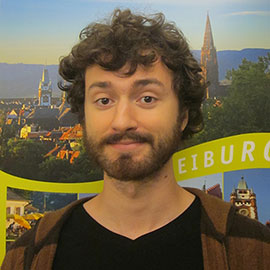 With my German department study grant, I boosted my language skills by exploring New German Cinema over the summer. Starting in 1962, a revolutionary wave of talented filmmakers broke generic and cultural norms with their intense, artistic vision. By the time Abscheid von Gestern (Yesterday Girl) won the Silver Lion at the Venice Film Festival, this generation of post-war auteurs was being called the New German Cinema.
With my German department study grant, I boosted my language skills by exploring New German Cinema over the summer. Starting in 1962, a revolutionary wave of talented filmmakers broke generic and cultural norms with their intense, artistic vision. By the time Abscheid von Gestern (Yesterday Girl) won the Silver Lion at the Venice Film Festival, this generation of post-war auteurs was being called the New German Cinema.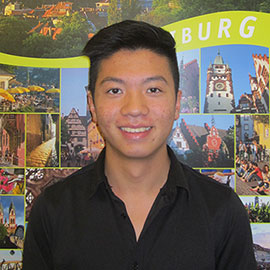 During the summer of 2015, I attended Middlebury College Language School with the generous financial help from the Department of German at Colgate. Middlebury currently operates 11 language schools and the year of 2015 is the centennial of the legendary Middlebury method, with the start of the German School in 1915.
During the summer of 2015, I attended Middlebury College Language School with the generous financial help from the Department of German at Colgate. Middlebury currently operates 11 language schools and the year of 2015 is the centennial of the legendary Middlebury method, with the start of the German School in 1915.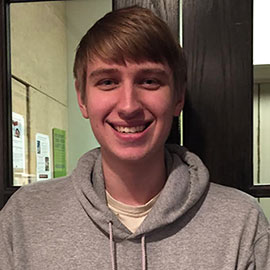 Before beginning my semester with the Freiburg Study Group, I spent the month of January and February 2015 working as an intern in the Carl Schurz Haus Deutsch Amerikanisches Institut Freiburg e.V. My tasks included helping to set up and run events pertaining to American culture, helping to teach workshops on English language and literature, and advertising our program with posters and social media. Our events ranged from American movie nights to comparing parenting techniques between the United States, Germany and China.
Before beginning my semester with the Freiburg Study Group, I spent the month of January and February 2015 working as an intern in the Carl Schurz Haus Deutsch Amerikanisches Institut Freiburg e.V. My tasks included helping to set up and run events pertaining to American culture, helping to teach workshops on English language and literature, and advertising our program with posters and social media. Our events ranged from American movie nights to comparing parenting techniques between the United States, Germany and China.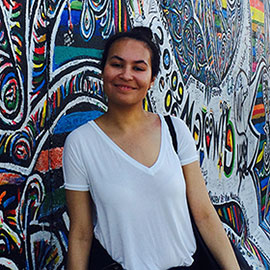 This grant allowed me to pursue tutoring before embarking to Germany to participate in the Freiburg Study Group program. I was already a year behind in my German studies when I decided to participate in this program, but having the opportunity to work with a tutor at home allowed me to catch up on pronunciation and overall comprehension before leaving for Germany.
This grant allowed me to pursue tutoring before embarking to Germany to participate in the Freiburg Study Group program. I was already a year behind in my German studies when I decided to participate in this program, but having the opportunity to work with a tutor at home allowed me to catch up on pronunciation and overall comprehension before leaving for Germany.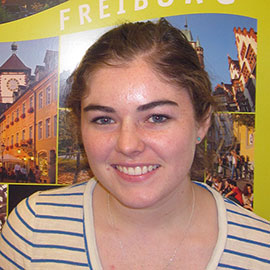 I used the German Study grant to support my position as an unpaid intern in Berlin from January to March 2015. My internship was with an organization called Entrepreneur’s Organization, which is a global organization of entrepreneurs focused on building successful businesses.
I used the German Study grant to support my position as an unpaid intern in Berlin from January to March 2015. My internship was with an organization called Entrepreneur’s Organization, which is a global organization of entrepreneurs focused on building successful businesses. Meine HiWi-Stelle ging darum, den Informationsverlust bei verschränkten Lichtteilchen (Photonen) zu erforschen. Man hat (theoretisch) Informationen auf Lichtteilchen gespeichert und die Teilchen in der ‘Atmosphäre’ von einem Punkt zum Andern geschossen.
Meine HiWi-Stelle ging darum, den Informationsverlust bei verschränkten Lichtteilchen (Photonen) zu erforschen. Man hat (theoretisch) Informationen auf Lichtteilchen gespeichert und die Teilchen in der ‘Atmosphäre’ von einem Punkt zum Andern geschossen.